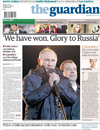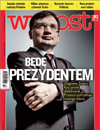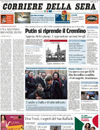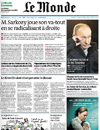“Sunday night was Vladimir Putin's Brezhnev moment," writes columnist Luke Harding in The Guardian -

It was when he ceased simply being an elected leader and segued towards a lifetime presidency. Having neatly sidestepped the rules by doing a stint as prime minister (no Russian leader can serve more than two consecutive presidential terms) Putin can now go on and on. Brezhnev did 18 years, Stalin 31. Despite the whispers of revolution lapping at the Kremlin's walls, who would bet against Vladimir matching Leonid? [...] Confronted with the spectre of an Orange Revolution, Putin has two options. He can try to assuage the demonstrators with the vague promise of liberal reforms, or he can use the same lugubriously repressive KGB tactics that have served on previous occasions: black PR against key opposition figures; arrests; and the perennial libel that his enemies are traitorous western stooges and US-backed "fifth columnists". Putin appears inclined towards the second, more thuggish, option.
And if the new tenant of the Kremlin wants to avoid a revolution, writes the Westdeutsche Zeitung, he must learn to compromise and metamorphosise from a authoritarian ruler into a pragmatic leader. Former Soviet President Mikhail Gorbachev had criticised Putin's dilemma very aptly -

If he does not get the better of himself and change the way he goes about things, this will end in the street. The international community ought to have some interest in seeing a Russian summer follow the Arab spring. Germany, in particular, depends on the country as a stable trading partner and supplier of raw materials. Up till now, we Germans have not had to worry about oil and gas deliveries. But do we have to face reality: the twilight of the Russian Tsar has begun.
On the same wavelength, Polish philosopher and historian of ideas [Marcin Król notes in Wprost](http:// http://www.wprost.pl/ar/308991/Polska-Rosja-Europa/) that -

Europe – its middling political leaders, but its leaders of the past as well, who seem to have been political giants – has always wanted to see peace and tranquility prevail in Russia. That is why Putin is a perfect solution for Europe – something he is well aware of, and he is not afraid of internal opposition. In truth, Europe would support democratic development in Russia, provided that the process is peaceful, without bloodshed or turmoil in international relations. In other words, Europe would be happy to see power in Russia flow to forces that are truly democratic – but it will not lift a finger to see it happen.
That view is shared by former Moscow correspondent Arrigo Levi, who, writing in the Corriere della Sera, wonders “What must Europe do?” with Russia. Twenty years after the fall of the USSR it remains unclear if the Russians “have learned to make good use of their freedom”, to quote the last Soviet leader, Mikhail Gorbachev -

The hope that Russia would turn into a multi-party democracy overnight was perhaps a bit too optimistic [...]. It seems that the desire for reform shown so strongly in the capital of the country is not shared by the rest of this vast landmass. [...] But things being what they are, it is in the interest of Europe to maintain a stable relationship of peaceful coexistence and economic and political cooperation, whatever the conditions.
"The conditions under which Mr. Putin had to snatch back his seat in the Kremlin [...] have no doubt left a bitter taste in his mouth," writes Le Monde -

In Moscow, he did not even win a majority of the votes. Contrary to appearances, Putin is no longer the master in his own house. For this victory he had to fight like never before. Russia has changed. The unprecedented protests that shook the capital and several major cities after the parliamentary elections of December 4 were marred by fraud reveals the awakening of a new class of citizens that the Kremlin leader will have to rely on. This new urban and informed middle class has, paradoxically, emerged and flourished under Putin. [...] If he wants [...] to modernise Russia, diversify its economy and make it a country that pulls some weight on the world stage [...] he should work with this rebellious middle class [and] show that, if Russia has changed, he too is capable of evolving.
Was this article useful? If so we are delighted!
It is freely available because we believe that the right to free and independent information is essential for democracy. But this right is not guaranteed forever, and independence comes at a cost. We need your support in order to continue publishing independent, multilingual news for all Europeans.
Discover our subscription offers and their exclusive benefits and become a member of our community now!












